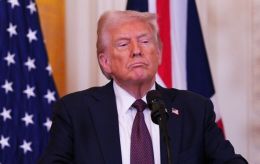EU is preparing new type of sanctions against Russia
 EU to impose sanctions on Russia for hybrid threats (Getty Images)
EU to impose sanctions on Russia for hybrid threats (Getty Images)
The European Union has decided to introduce a thematic sanctions regime, specifically focused on addressing hybrid threats from Moscow, according to Radio Liberty journalist Rikard Jozwiak.
According to Jozwiak, EU ambassadors are expected to agree on the new thematic sanctions regime on October 2, targeting Russian hybrid threats. The formalization is set for the following week.
"No names yet but will be added in the future," he said.
Initially, there were discussions about implementing a general sanctions regime, but it was ultimately agreed that the focus would be on Russian threats.
EU sanctions against Russia
The European Union has imposed a wide array of sanctions on Russia in response to its invasion of Ukraine. These sanctions span multiple sectors, aiming to exert economic pressure on Russia and force it to halt military operations.
Key areas of the sanctions include:
- Financial sanctions: Restrictions on transactions with Russia’s central bank, freezing assets of Russian banks and oligarchs, and prohibiting certain financial services.
- Energy sanctions: Limits on the import of Russian oil and gas, along with a ban on new investments in Russia’s energy sector.
- Trade sanctions: Prohibition of exports to Russia of specific goods and technologies that could support its military industry.
- Transport sanctions: Closure of EU airspace to Russian aircraft and restrictions on Russian vessels entering EU ports.
- Visa restrictions: Limited visa issuance for Russian citizens.
- Personal sanctions: Measures targeting Russian politicians, oligarchs, and other individuals involved in decisions concerning the invasion of Ukraine.
Latest sanctions package
The current sanctions regime is in its 14th package, adopted in June 2024. It includes:
- Additional personal sanctions: The inclusion of 116 individuals and entities linked to subversive activities against Ukraine.
- Energy sector restrictions: The EU has banned the transshipment of Russian liquefied natural gas (LNG) within its territory.
- Financial transaction limits: EU organizations are prohibited from connecting to Russia’s financial messaging system.
As noted by EU sanctions envoy David O'Sullivan, sanctions are not a magic bullet but are designed to make it more difficult, slower, and costlier for Russia to sustain its military machine.

